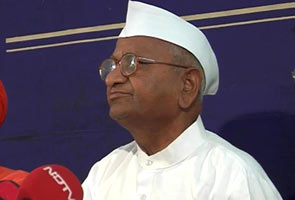Just 70 days ago, the UPA government succumbed to the pressure exerted by Team Anna, which posed as civil society being supported by advocates and actors, ex-babus , bloggers and twitteratti, swamis and social activists. The high decibel show at Jantar Mantar numbed the government's political and constitutional thinking.
Foxed by the red herring of Team Anna's popularity, the Manmohan Singh government quickly agreed for a joint committee to draft the Lokpal Bill only to realise the taste of the pudding is in its eating. Public placating of Team Anna was easy, but translating their exasperating demands was legally excruciating.
Though the Congress has now stressed the government will not succumb to Team Anna's pressures, the draft prepared by both sides, despite their inherent disagreements, has one thing in common.
Representatives of both Team Anna and government have perceived more or less a Lokpal who will investigate, prosecute and then change cloaks to stand as jury and judge. This all-rolled-into-one power Centre is abhorrent to any democratic system of governance, which gets its legitimacy from a fair system of justice delivery.
Why did the government first succumb to Team Anna, then criticise it and now question its representatives' character? Does it reflect the vacillating mindset of the two power centres - the PM and the Congress president? Why did ministers rush to discuss with Team Anna on the one hand while on the other, a senior party leader publicly criticised the move? He also went around saying it was time for a young PM?
The PM will celebrate his 80th birthday on September 26 next year. Rahul Gandhi will turn 42 in June 2012. Singh has not contested a Lok Sabha election, a victory in which transforms a candidate into a people's representative. Rahul has won twice from Amethi.
It is difficult to judge Singh's feelings on the vacate-the-chair talk from within Congress circles when he is perceived to be engaged in finding solutions to the most trying situations, both political and social.
But what must be worrying the PM and the entire political class is the confrontational build up between the representatives of people and the 'civil society' to garner space in the legislative arena in the name of participatory democracy.
Can self-proclaimed representatives of civil society be recognised as harbingers of new legislative framework when the Constitution recognises only the Parliament and Assemblies as law-makers ?
In the early 1970s, the famous Keshavananda Bharati case was argued before a 11-judge bench of the SC on Parliament's power to amend the Constitution. The Indira Gandhi government had argued that a political party enjoying two-thirds support in both Houses of Parliament could delete all provisions.
The bench's shock and dismay forced the government to mould its arguments, "Though legally, there is no limitation to the amending power, there are bound to be political compulsions which make it impermissible for Parliament to exercise its amending power in a manner unacceptable to the people at large."
Foxed by the red herring of Team Anna's popularity, the Manmohan Singh government quickly agreed for a joint committee to draft the Lokpal Bill only to realise the taste of the pudding is in its eating. Public placating of Team Anna was easy, but translating their exasperating demands was legally excruciating.
Though the Congress has now stressed the government will not succumb to Team Anna's pressures, the draft prepared by both sides, despite their inherent disagreements, has one thing in common.
Representatives of both Team Anna and government have perceived more or less a Lokpal who will investigate, prosecute and then change cloaks to stand as jury and judge. This all-rolled-into-one power Centre is abhorrent to any democratic system of governance, which gets its legitimacy from a fair system of justice delivery.
Why did the government first succumb to Team Anna, then criticise it and now question its representatives' character? Does it reflect the vacillating mindset of the two power centres - the PM and the Congress president? Why did ministers rush to discuss with Team Anna on the one hand while on the other, a senior party leader publicly criticised the move? He also went around saying it was time for a young PM?
The PM will celebrate his 80th birthday on September 26 next year. Rahul Gandhi will turn 42 in June 2012. Singh has not contested a Lok Sabha election, a victory in which transforms a candidate into a people's representative. Rahul has won twice from Amethi.
It is difficult to judge Singh's feelings on the vacate-the-chair talk from within Congress circles when he is perceived to be engaged in finding solutions to the most trying situations, both political and social.
But what must be worrying the PM and the entire political class is the confrontational build up between the representatives of people and the 'civil society' to garner space in the legislative arena in the name of participatory democracy.
Can self-proclaimed representatives of civil society be recognised as harbingers of new legislative framework when the Constitution recognises only the Parliament and Assemblies as law-makers ?
In the early 1970s, the famous Keshavananda Bharati case was argued before a 11-judge bench of the SC on Parliament's power to amend the Constitution. The Indira Gandhi government had argued that a political party enjoying two-thirds support in both Houses of Parliament could delete all provisions.
The bench's shock and dismay forced the government to mould its arguments, "Though legally, there is no limitation to the amending power, there are bound to be political compulsions which make it impermissible for Parliament to exercise its amending power in a manner unacceptable to the people at large."
